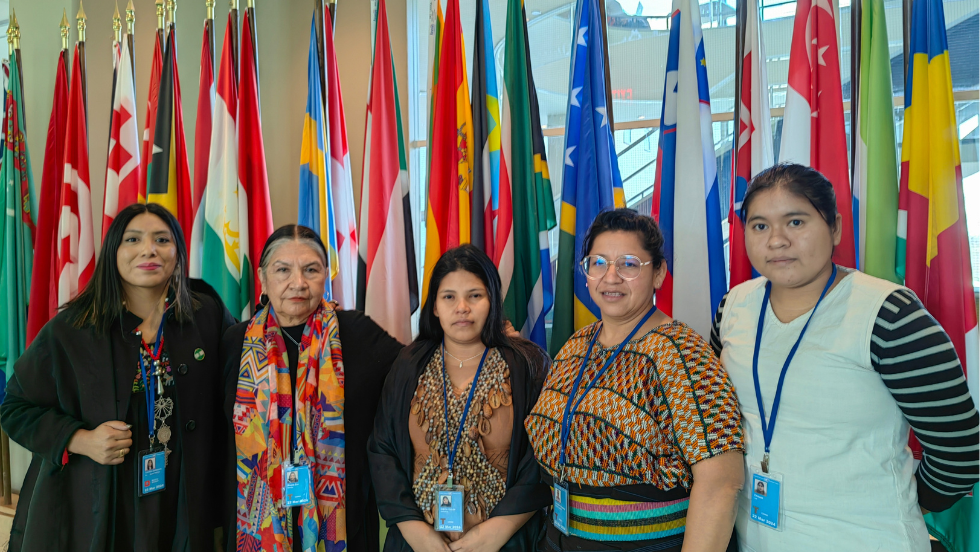Indigenous women present proposals for eradicating poverties from their vision on economic justice
Position statement in the context of the 68th session of the Commission on the Status of Women (CSW68)
Nueva York, marzo 2024
The Continental Network of Indigenous Women of the Americas (ECMIA) represents organized Indigenous women, young women and girls from 23 countries of the continent. For nearly three decades, ECMIA has been a driving force for the empowermentand defenseofindividual and collective rights.
According to the ILO (2019), Indigenous women in the Americas are approximately 32 million.Unfortunately, in all countries of the region, we find ourselves represented on the map of poverty and extreme poverty, without basic needs met and our youth suffering from new forms of slavery and exploitation. The States, including the countries of the North, have not paid due attention to this situation and, therefore, we are here, committed to contribute with our inputs to the eradication of these forms of poverties.
ECMIA has been reflecting on the economy and the impact of poverties on our lives from an intergenerational, intercultural, gender equality and individual and collective rights perspective. Our conclusion is that poverties must be addressed in the plural, as it encompasses various dimensions beyond just monetary deprivation. These include political, social, economic, cultural, environmental, food, education, territorial security, as well as spiritual and emotional aspects. These multidimensional poverties persist due to social, structural, racist and colonial factors.
The invisibility, invalidation, dispossession, discrediting, and illicit appropriation of our territories, resources, knowledge and practices exacerbate these forms of poverties, disproportionately affecting Indigenous women, young women and girls.
Indigenous peoples, women, youth and children inhabit territories rich in minerals, forests, water and other natural resources, which are the object of "development" that sustain the economy of States and companies. However, we are used without fair compensation, and we resist to continue to be considered as sectors of extreme poverty and only as recipients of assistance.
Therefore, it is essential to define our position as Indigenous peoples, women, youth and children, demanding fair and equitable treatment in the distribution and redistribution of the results of economic activities in the States. We must be include as principal actors in the decision-making processes that affect our systems of life, food, education and health for the sustainability of life.
As Indigenous women, youth and children we make great contributions to the economy of our countries, which are not valued or recognized in macroeconomic indicators. We contribute to the eradication of poverties through our productive and reproductive role, as well as our role in the care of community, territory, biodiversity and MotherEarth. This has impacts for us, for our peoples and for all humanity.

Based on the principles of reciprocity, solidarity, complementarity, fair reward, identity belonging, respect, care, and non-predation of Mother Earth, ECMIA recommends:
- Guarantee the right to self-determination and full participation, consultation, and free, prior, and informed consent of Indigenous peoples, women, youth, and children in decision-making on plans, programs, and policies affecting their lives and economic systems, in accordance with ILO Convention 169, the United Nations Declaration on the Rights of Indigenous Peoples, and CEDAW General Recommendation No. 39 on the rights of Indigenous women and girls.
- Acknowledge, make visible, and value the contributions of Indigenous women, youth, and children to the economy through the allocation of appropriate and sustainable budgets for the creation and implementation of policies and programs and the generation of conditions for the development of their own economies.
- Measure, compile, disaggregate, and use data that reflect the economic situation of Indigenous women, youth, and children, incorporating Indigenous peoples’ vision of poverty, considering its multiple dimensions.
- Ensure that social protection systems, public services, and all State measures aimed at eradicating poverty contribute to the preservation, strengthening, and revitalization of Indigenous economic systems, economic autonomy, economic justice, and Indigenous governance. These measures should include accountability, transparency, oversight mechanisms, and guarantee the effective participation of Indigenous women, youth, and children.
- Adopt comprehensive measures to guarantee access for Indigenous youth and children to quality, intercultural, and culturally relevant education to help break the cycle of poverty.
- Guarantee comprehensive and inter-institutional mechanisms for the eradication of both legal and illegal labor and sexual exploitation of Indigenous women, youth, and children, particularly in mining and extractive areas, which lead to disappearance, trafficking, murder, and femicide.

